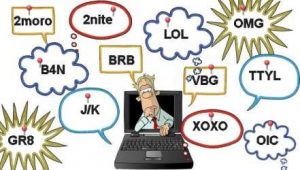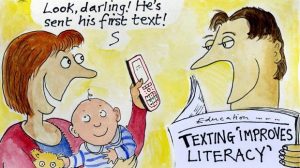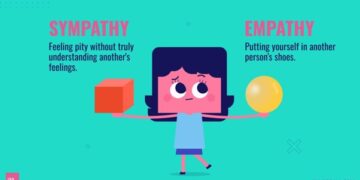Texting undermines language skills
 What is XOXO, TMI, SOL, ROFL, LMAO, RBTL or OIC? Yes, these words sound dribbling and irksome but still they have become part and parcel of the lexicon. Our desktop messaging has shifted to our smart phones and tablets and spelling and grammar have gone for a toss. Hundreds of texting jargons have replaced meaningful information and the bizarre texting has made us lazier mentally as well as physically. They have added new tool of string to our communication; so much so that these days the examination answers sheets also consist of some of the texting language. So friends, computers, laptops, iPads, iPods, and Kindles have some disastrous effects on today’s written and spoken communication. And lately, the abbreviated messaging has found its way into business communication.
What is XOXO, TMI, SOL, ROFL, LMAO, RBTL or OIC? Yes, these words sound dribbling and irksome but still they have become part and parcel of the lexicon. Our desktop messaging has shifted to our smart phones and tablets and spelling and grammar have gone for a toss. Hundreds of texting jargons have replaced meaningful information and the bizarre texting has made us lazier mentally as well as physically. They have added new tool of string to our communication; so much so that these days the examination answers sheets also consist of some of the texting language. So friends, computers, laptops, iPads, iPods, and Kindles have some disastrous effects on today’s written and spoken communication. And lately, the abbreviated messaging has found its way into business communication.
The pen and paper is replaced with computer and mobile key board with an added icing – the smiley. About 23 years ago on 3rd Dec 1992, a young British engineer named Neil Papworth sent the world’s first text message from a computer to his boss’s cell phone. It read: “Merry Christmas” this brief and crisp message revolutionized communication globally. Today, more than million text messages are sent every second in the world. The old bulky mobile phones of the 1990s have progressed into multi-tasking smart phones and text messaging has become part of our daily interactions. A recent World Bank study estimated that about three quarters of the world’s population now has access to cell phones. Trillions of text messages are sent around the globe every day. Some experts says that texting may soon become a thing of the past, as more people turn to instant-messaging and voice-messaging apps on their smart phones.
Many studies show that texting and using other types of instant messaging such as Facebook or email actually hurts relationships. Though texting is a practical tool, it lacks tone, sentiment, facial expressions, body language, and eye contact completely. Many times it causes misinterpretation, confusion, and sometimes even deception. It simply diminishes social skills of people. Words and phrases such as ‘whatever,’ ‘too much information’, ‘as far as I know’ and ‘end of discussion’ is commonly misinterpreted because it has more than one meaning. Texting is a too drab and dry style of communication. In the world of business and professional writing, the figure 4 does not mean ‘for’ and 2 does not mean the same as to or too. I think because of too much of texting and always glued to their smart phones younger people even in face to face communication look emotionless, less interested and plain. In serious business communication these texting abbreviations and short-cuts have no place.
When you communicate through messages you tend to end your chat very soon. On the contrary, telephone calls and face-to-face conversations take longer time to end. The reason is that you get tired while typing and talk to the point. Talking to the point is only a surface level communication as we are not aware of the emotional state of the person we are chatting with. Another reason why texting ends in short-cuts is because texting take a lot of time and you get tired while typing words. So you prefer to be crisp and brief while writing.
 Shortcuts with spellings, punctuation and using engendered acronyms have spoiled the language skills of today’s generation. Do you know, texting interrupts brain function and takes away concentration? Texting distracts focus on work at hand. It does not allow peace of mind to work.
Shortcuts with spellings, punctuation and using engendered acronyms have spoiled the language skills of today’s generation. Do you know, texting interrupts brain function and takes away concentration? Texting distracts focus on work at hand. It does not allow peace of mind to work.
But, on the other hand, texting may prove beneficial to those who are introvert. They prefer just expressing their emotions in shortcut. But it will not allow them to come out of their shell. They will remain shy and normally, such people are seen with stammering problem as well. For many adults like me, the task of understanding text messages from the younger generation is often bothersome. I think smart phones are reducing productivity of people using it 24X7. It’s better to maintain distance with it little by little by developing some diversion.












































